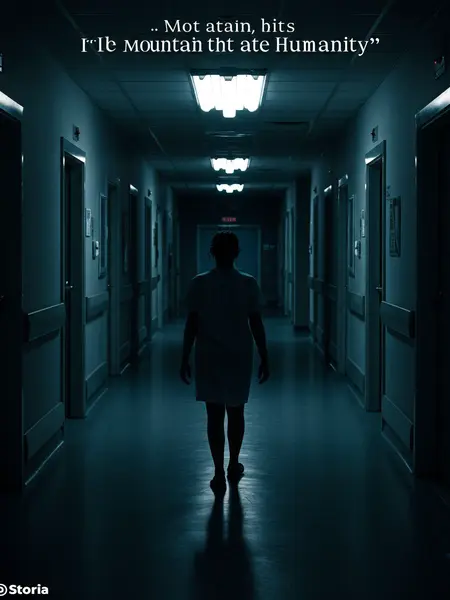Chapter 2: Storm-Wracked
I work as a psychiatrist at St. Augustine Behavioral Health Center, a brick-and-glass hospital tucked between the pines just north of Boston. St. Augustine’s sits just north of Boston, the kind of place where pine needles carpet the parking lot and Red Sox bumper stickers outnumber the staff. A week ago, we admitted a patient whose case would keep me up at night, staring at my ceiling fan as it spun slow circles in the dark.
His name was Michael Grant, a well-known professor of archaeological anthropology at Harvard. He’d been the principal investigator on a deep-sea exploration project funded by NOAA and the Smithsonian—a man whose mind was once razor-sharp and reliable as a Swiss watch.
But since he came back from that expedition, he’d lost touch with reality, as if something down there had reached up and taken him apart piece by piece.
He muttered the same phrases, almost like a prayer, whenever anyone approached:
"John Gable moving the mountain is a lie. Humanity has utterly failed.
No, there is no such thing as humanity in this world. Everything is fake."
I prescribed him a cocktail of antipsychotics and mood stabilizers—Risperdal, Seroquel, even a trial of ketamine. Nothing touched the delirium. He stared through the window at the storm-wracked Massachusetts sky as if waiting for something to rise out of the clouds.
Out of options, I decided to try the human approach—conversation. Maybe somewhere inside him, a kernel of reason was still reachable.
I found him in his hospital room, sitting rigid in a blue paper gown, hands clenched in his lap. The beeping from the hallway and the faint smell of antiseptic made the air seem thinner. I tried, for nearly an hour, to reach him, but every question slid off him like water off waxed glass.
Frustrated, I rose from my plastic chair, ready to call it for the day. The silence in the room was thick as wet cement.
But just as I reached for the doorknob, Professor Grant’s voice shot out behind me, sharp and sudden as a snapped string.
"Have you heard the story of John Gable moving the mountain?"
My hand froze. I turned, heart pounding, drawn back by the familiar American myth. "Of course I’ve heard it. It’s an old story—my dad used to tell it before bed, like a fairy tale. Every kid in my neighborhood knew it."
In a flash, Grant lunged forward, his grip on my wrist iron-strong, his eyes wild and bloodshot, the scent of sweat and fear coming off him in waves. For a split second, I wondered if he’d lunge at me. My fingers tightened around the call button.
He stared into me and bellowed, "John Gable did not move the mountain. John Gable ate the mountain.
The mountain is John Gable. John Gable is the mountain."
Then he began clawing at his own arms, nails raking over pale skin as if trying to dig beneath the surface, to find something hidden. The scene was horrifying, almost animal. My stomach turned, but my training kicked in. I hit the call button for help.
Three burly orderlies rushed in, their sneakers squeaking on the linoleum as they struggled to restrain him. Even so, it took all three to hold him down. His screams echoed down the hallway, twisting into something that barely sounded human.
By dawn the next day, Professor Grant was gone. His room was locked from the outside—no way out, not even a cracked window. The only thing left was the faint, lingering smell of sweat and ink, and the hollow hush of a room that had lost its occupant.
We tore the place apart, searching for clues—a loose vent, a shattered tile, a trail of blood. Nothing. The man had vanished as if spirited away.
The only thing we found was a diary, left on the nightstand. Its pages were yellowed and warped, the corners bent from being thumbed over and over. I picked it up, flipping it open as a chill prickled along my spine, like ice water trickling beneath my collar.
The diary chronicled the events of his deep-sea expedition in meticulous detail. As I read, a creeping dread settled in my gut, colder than the Boston Harbor in February.
It sounded impossible—almost delusional. But the details were too vivid to dismiss.
Maybe the entire human species is a lie.
There is no such thing as humanity in this world.

